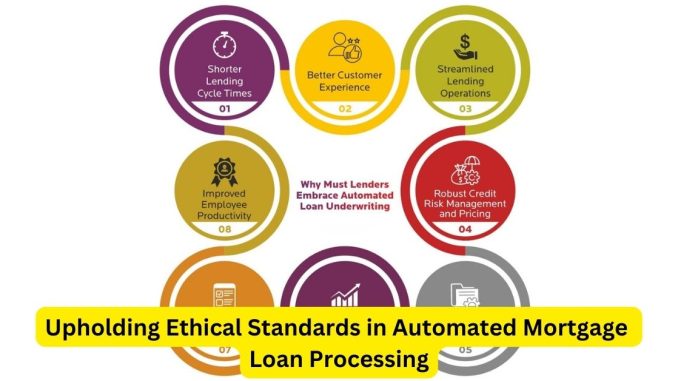
The integration of automation in mortgage loan processing has streamlined operations, enhancing efficiency and expediting transactions. However, as technology evolves, maintaining ethical standards in this automated landscape becomes paramount to ensure fair, transparent, and compliant lending practices.
- Data Privacy and Security: Automation involves handling vast amounts of sensitive borrower data. Upholding ethical standards demands stringent data protection measures to safeguard confidentiality, prevent data breaches, and comply with privacy regulations like GDPR or CCPA.
- Fair and Unbiased Decision-Making: Automated systems must be programmed to make fair and unbiased lending decisions. Ethical concerns arise if algorithms inadvertently discriminate based on race, gender, or other protected characteristics, violating fair lending laws.
- Transparency and Informed Consent: Borrowers must be informed about the use of automated systems in loan processing. Full transparency ensures borrowers understand the process and can provide informed consent regarding the use of their data.
- Algorithmic Accountability: Ethical standards necessitate accountability for automated systems. Regular audits and assessments of algorithms ensure they remain fair, accurate, and compliant, minimizing the risk of unintended biases or errors.
- Human Oversight and Intervention: While automation streamlines processes, human oversight is crucial. Ethical guidelines require human intervention to review and override automated decisions in cases of ambiguity or exceptional circumstances.
- Compliance with Regulatory Requirements: Ethical automation aligns with compliance with all relevant laws and regulations governing mortgage lending. Adherence to legal frameworks ensures ethical behavior in loan processing, preventing regulatory violations.
- Professional Responsibility of Lenders and Developers: Lenders and developers of automated systems hold the responsibility to ensure their technology aligns with ethical standards. This includes designing systems that prioritize fairness, accuracy, and compliance.
- Continual Education and Training: Professionals involved in automated loan processing should receive ongoing education on ethical considerations. This empowers them to recognize potential ethical dilemmas and navigate them appropriately.
- Consumer Protection and Redress Mechanisms: Ethical practices include providing consumers with avenues for addressing grievances or disputing automated decisions. Clear mechanisms for redress ensure borrowers can challenge decisions they perceive as unfair.
- Mitigating Bias in Data Sets: Ethical automation involves actively identifying and addressing biases present in data sets used for decision-making. Ensuring diversity and fairness in data sources reduces the risk of biased outcomes.
In conclusion, as automation continues to revolutionize mortgage loan processing, upholding ethical standards remains imperative. Integrating ethical considerations into automated systems ensures that technological advancements serve borrowers fairly, transparently, and in compliance with legal and moral standards. A concerted effort by industry stakeholders to prioritize ethical practices in automated loan processing fosters trust, integrity, and fairness within the mortgage lending ecosystem.
Leave a Reply